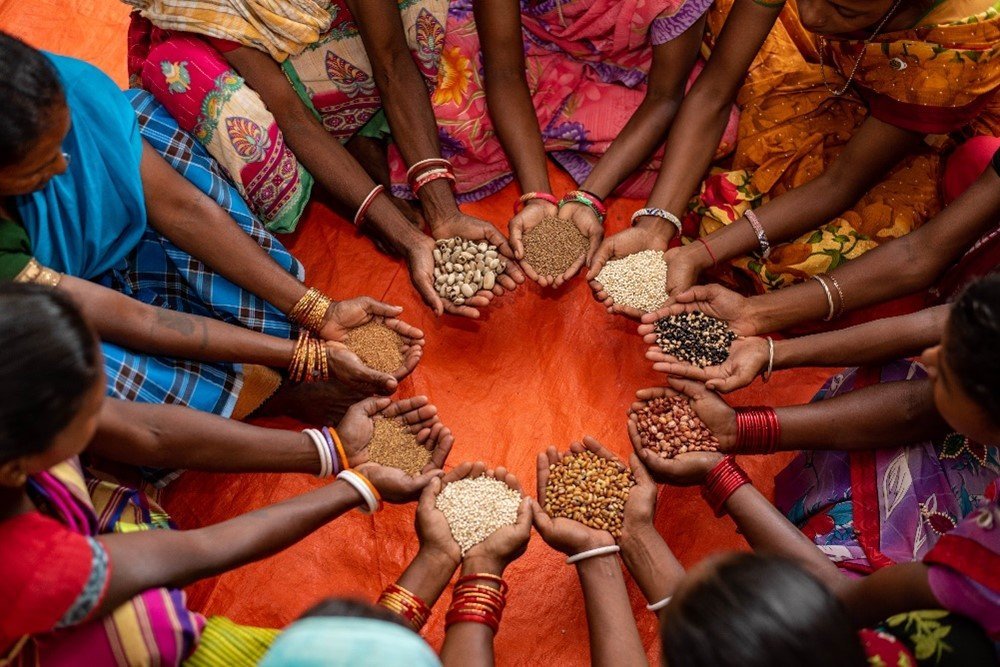“Seeds are our lifeline, we cannot think of farming if we do not save our seeds.”
Seeds may become an unspoken tragedy of the Ukrainian war – fighting near Kharkiv has resulted in the partial destruction of Ukraine’s national seed bank, a library of seeds designed to safeguard generic diversity and future harvests, and which contains over 2,000 crop samples.
The buying and selling of seeds expose many of the issues we see throughout the current trade system – both good and bad.
There are basically two sets of seeds in the world – specific varieties ‘owned’ by huge corporate firms as a commodity, and seeds free from copyright ‘belonging’ to farmers, which are normally shared, or bought and sold in informal arrangements.
Farmers seeds are diverse – they are locally specific, and often more resilient against pests, as they are adapted to the regional climate. Biodiversity is vital to combatting the climate crisis – but over the last 100 years, 94% of our seed varieties have disappeared. Why is this? In part, it’s due to commercial seeds – known as commodity seeds.
Commodity seeds are a global business. Just four companies own 60% of the global seed market.* They also sell the specific fertilizers designed to work with these patented seeds and own 75 per cent of the global pesticides market. These chemicals come with their own set of problems – contaminating the air, ground and water, damaging the soil and wiping out natural biodiversity.
A recent UN Report explained that “This high concentration of corporate power allows a relatively small group to restrict people’s access to seeds, and to shape markets and innovation in a way that serves the ultimate goal of shareholder profit maximization and not the public good.”
In short, commodity seeds expose what happens when power is held by a small number of unaccountable global businesses, or the commercial interests of a small number of people driven by profit at the expense of people and planet.
But it’s not all bad news.
Indigenous seeds can be protected – and Transform Trade is supporting communities who have solutions.
In the Jharkhand region in India, the indigenous Pahadiya tribes cultivate crops on hill slopes, including maize, cowpea, rice bean, millet and pulses. Their economic security depends on the safe preservation of seeds for the next growing season, a responsibility held by women within the household.
However, during times of hardship, seeds are sold to commercial traders who later resell the seeds at inflated prices. This manipulation causes financial losses for the most disadvantaged households and takes control of the seeds from the people who hold traditional knowledge of agricultural practices in the region, threatening local food security.
Transform Trade works closely with village groups to create community seed banks, which operate like a library – seeds can be borrowed and returned, and diverse varieties preserved for future generations. There are currently 4 seedbanks serving more than 1300 households, and during the Covid-19 lockdowns they gave those suffering the most access to seeds in time for the growing season.
As Namita Paharin, one of the farmers from the community who own the seed bank said:
“Seeds are our lifeline, we cannot think of farming if we do not save our seeds.”
The global trade in seeds demonstrates both the power of trade done well – when power is shared with those producing and growing, and doesn’t harm the planet – and the potentially devastating consequences of trade which centres profit over people and the earth we all rely on.
Sowing the seeds for a sustainable future is what Transform Trade is all about - and setting up a regular gift goes a long way to building community resilience like the Pahadiya village groups we work with.


